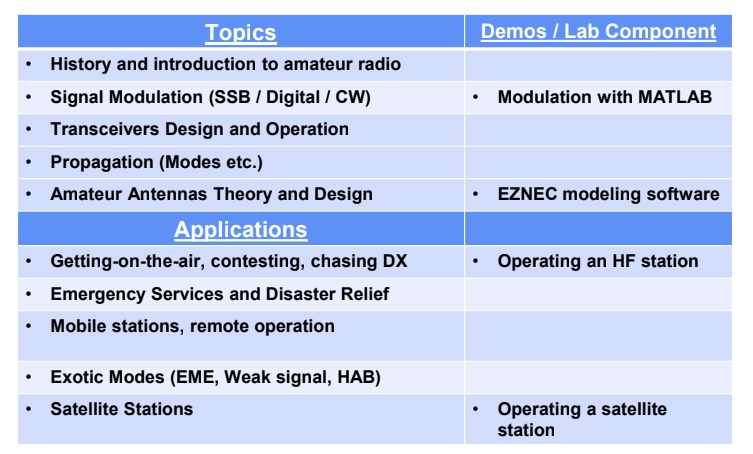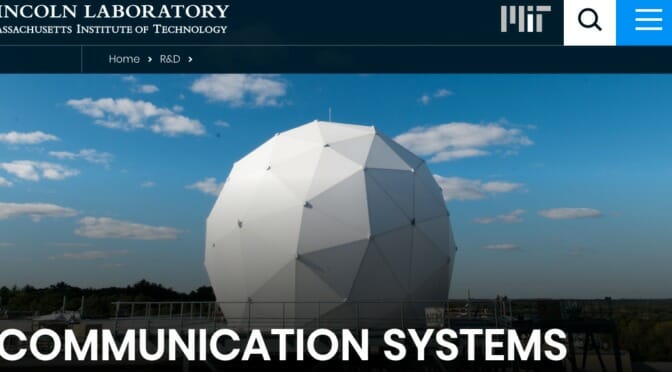Back in December 2017, I was awkwardly stuffing my face with food at my group’s annual Christmas party. In the middle of munching some seriously tasty treat, one of my bosses approached to me and says he heard I was a ham. I nodded my head (b/c verbally acknowledging his comment would have caused food to spew out) and he subsequently asked if I would be interested in organizing an Intro to Amateur Radio Course via the Technical Education Committee at my place of work (MIT Lincoln Laboratory). I felt the need to clarify. I said something to the effect of: “So wait, you’re going to pay me to essentially do my hobby at work?” He nodded and told me to take some time to think about it. Yeh…so…didn’t need a whole lot of time.
First order of business: What am I going to make this course about? I tried to do my HW and research what are the essential topics to cover. I decided I would do a 10-week course: 5 weeks to technical topics, and 5 weeks for applications of the hobby. You can see in the image below what I decided on. That’s a relatively concrete outline:
Secondly: who’s going to help me out? I pinged a generic bulletin board at work asking for volunteers to be lecturers and demo preppers for various topics. The response I received back was phenomenal. Numerous folks (order 30 people or so) offered to help out. After attrition, and various folks realizing this was a serious time commitment, the list whittled down to around 10 or so. I was still happy. Additionally, I was even able to recruit our very own Burns Fischer to participate and do an AMSAT lecture! (Thanks, Burns)
Thirdly: how to keep the lecturers honest and encourage them to follow through. I borrowed a strategy that my colleague used for his digital communications course at work. You have a slide deck laydown 1 month out (that means the speakers come prepared with printed out copies of their slides and they lay them out on a table and we go through them for 1.5-2 hours) and enforce a dry-run 2 weeks out from their dedicated class time. Because this was all volunteer work, I couldn’t rip apart people’s slides too much, so the deadlines were more to stay on top of folks and gently remind them of their obligation.
The admin aspect of the job threw me for a loop. I didn’t expect to have to get so down in the weeds. From security issues to generic scheduling of dates, it was slow-going. Especially in the summertime.
But the reward of doing it all — oh the reward. After some pretty effortless advertising on my part, I was told by HR that we had 60 people enrolled in the course with a solid waitlist; this was the most popular course in the Fall. My. Mind. Was. Blown. I mean it was and it wasn’t. I work at a place with a ton of engineers who love RF as much as their children. But at the same time, I didn’t expect so many young people want to learn what this hobby was all about. I’m glad they signed up.
Our kickoff class was September 12. Myself and my co-organizer spoke to a packed room plus full of interested people. I remain in awe of the interest level of the students and feel fortunate to be a part of this entire ordeal. Maybe this is the beginning of something lasting. The hard part is determining what are the next steps once the class has concluded.
Thanks for reading,
Brian AB1ZO


Always enjoy your articles and input Brian.
Keep up the hard work and please post updates on the course!
Craig – AC1BK
Congrates Brian. This probably falls under the theory that life is cyclical. Whats old is new again.
And think of all the knowledge your bringing into our hobby. Good Going.
Patrick
KC1HDN
Great story. And, please accept a nod of appreciation for all the hard work you did to pull together a class. That is a serious commitment of time!
Having spent 25 years at MITRE, I had some interaction with the MIT guys up the hill at Hanscom AFB. I find it amusing that there are a number of MIT folks that are interested in learning about amateur radio. Many of the people I met got into their career fields through amateur radio. I guess today’s engineers under the age of 40 (I’m way past that) got into their technical fields via computers. All the RF stuff us graybeards learned is now locked in Google servers. New applications for RF seem to rest on writing an app for them more than the blood, sweat and curses of hardware development, hi.
Thanks for all the comments everyone. I really appreciate the feedback and kind words.
Ed, to your point, I ended up switching career paths because of the hobby. I switched into a digital comms group last year and am trying to catch up to people who have been doing this stuff for as long as you if not longer. I think looking back I would have done EE in college/grad school. But I won’t lament too much; I’ve gotten this far so I’m happy!
The next steps? You mean before or after getting the class to a VE session? 🙂 Anyway, great work!